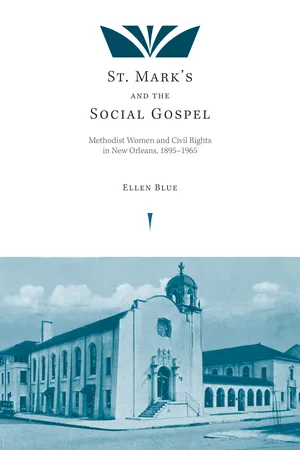
St. Mark's and the Social Gospel
Methodist Women and Civil Rights in New Orleans, 1895–1965
- 321 pages
- English
- PDF
- Available on iOS & Android
St. Mark's and the Social Gospel
Methodist Women and Civil Rights in New Orleans, 1895–1965
About this book
The impact of St. Mark’s Community Center and United Methodist Church on the city of New Orleans is immense. Their stories are dramatic reflections of the times. But these stories are more than mere reflections because St. Mark’s changed the picture, leading the way into different understandings of what urban diversity could and should mean. This book looks at the contributions of St. Mark’s, in particular the important role played by women (especially deaconesses) as the church confronted social issues through the rise of the social gospel movement and into the modern civil rights era.
Ellen Blue uses St. Mark’s as a microcosm to tell a larger, overlooked story about women in the Methodist Church and the sources of reform. One of the few volumes on women’s history within the church, this book challenges the dominant narrative of the social gospel movement and its past.
St. Mark’s and the Social Gospel begins by examining the period between 1895 and World War I, chronicling the center’s development from its early beginnings as a settlement house that served immigrants and documenting the early social gospel activities of Methodist women in New Orleans. Part II explores the efforts of subsequent generations of women to further gender and racial equality between the 1920s and 1960. Major topics addressed in this section include an examination of the deaconesses’ training in Christian Socialist economic theory and the church’s response to the Brown decision. The third part focuses on the church’s direct involvement in the school desegregation crisis of 1960 , including an account of the pastor who broke the white boycott of a desegregated elementary school by taking his daughter back to class there. Part IV offers a brief look at the history of St. Mark’s since 1965.
Shedding new light on an often neglected subject, St. Mark’s and the Social Gospel will be welcomed by scholars of religious history, local history, social history, and women’s studies.
Frequently asked questions
- Essential is ideal for learners and professionals who enjoy exploring a wide range of subjects. Access the Essential Library with 800,000+ trusted titles and best-sellers across business, personal growth, and the humanities. Includes unlimited reading time and Standard Read Aloud voice.
- Complete: Perfect for advanced learners and researchers needing full, unrestricted access. Unlock 1.4M+ books across hundreds of subjects, including academic and specialized titles. The Complete Plan also includes advanced features like Premium Read Aloud and Research Assistant.
Please note we cannot support devices running on iOS 13 and Android 7 or earlier. Learn more about using the app.
Information
Table of contents
- Contents
- Acknowledgments
- Abbreviations
- Introduction
- Part I: Methodist Women Doing Settlement Work: 1895–World War I
- Part II: Work for Gender and Racial Equality: 1920s–1960
- Part III: Crises in Church, Center, and City: 1960–1965
- Part IV: Post-1965 and Conclusion
- Appendix A: Sources for Research on MECS Women’s Work
- Appendix B: A Charter of Racial Policies
- Notes
- Index